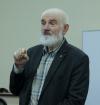References
- Alekseev S. V. To the question of the culture of sustainable development and its assessment. In: Biologiya v shkole. 2015. № 3. P. 47–57 (In Russ.)
- Bozhovich L. I. Personality and its formation in childhood. Sankt-Petersburg, 2008. 398 p. (In Russ.)
- Bondarevskaya A. I. Cultural and educational space of the university as an environment for professional and personal self-development of students. Rostov-na-Dony, 2010. 186 p. (In Russ.)
- Brazgovskaya E. E. Semiotics. Languages and Codes of Culture. Moscow, 2019. 187 p. (In Russ.)
- Bry`kalova O. G. The basic culture of personality in pedagogical reflection. In: Sibirskij pedagogicheskij zhurnal. 2010. № 10. P. 99–106. (In Russ.)
- Vinokurova N. F., NikolinaV. V., Efimova O. E. Methodological foundations of the formation of environmental culture of students on the basis of the ideas of eco-development. In: Obrazovanie i nauka. 2016. № 5 (134). P. 25–40. (In Russ.)
- Vitkovskaya I. N. Ekologicheskaya kul'tura v sisteme socioprirodnogo vzaimodejstviya : avtoref. dis. … kand. filos. nauk. Minsk, 1999. 32 p. (In Russ.)
- Vy`zhleczov G. P. The Axiology of Culture at the Turn of the Century. In: Mezhdunarodny`j zhurnal issledovanij kul`tury`. 2016. № 2 (23). P. 15–26. (In Russ.)
- Gazman O.S. Bazovaya Basic personal culture. In: Teoreticheskie i istoricheskie problemy`. Moscow, 1989. 150 p. (In Russ.)
- Genisaretskij O. I. Ecology of Culture. Theoretical and design problems. Moscow, 1991. 153 p (In Russ.)
- Gessen S. I. Fundamentals of Pedagogy. Introduction to Applied Philosophy. Moscow, 1995. 236 p. (In Russ.)
- Gorlachev V. P., Agadzhanyan A. N. Man: Ecology, culture, education. Moscow, 2003. 178 p. (In Russ.)
- Dzyatkovskaya E. N. The contradictions of environmental culture and the problem of selecting the content of school environmental education. In: Ucheny`e zapiski ZabGU. Seriya: Biologicheskie nauki. 2009. № 1. P. 62–67. (In Russ.)
- Dzyatkovskaya E. N. Features of modern ecological culture in the content of future teachers' training. In: Sovremennoe pedagogicheskoe obrazovanie. 2022. № 4. P. 10–13. (In Russ.)
- Dzyatkovskaya E. N. Education for Sustainable Development. Cultural concepts. Green Axioms. Transdisciplinarity. Moscow, 2015. 328 p. (In Russ.)
- Doroshko O. M. Modern approaches to the definition of the concept of «Ecological Culture». In: Russian Journal of Education and Psychology. 2012. № 9. P. 32–40. (In Russ.)
- Dukal`skaya I. V. The Role of the Semiotic Approach in the Implementation of Intercultural and Linguocultural Communication. In: Vestnik ChelGU. 2018. № 10 (420). P. 99–103. (In Russ.)
- Zaxlebny`j A. N., Dzyatkovskaya E. N. A Cultural Approach to Modern Environmental Education. In: Vestnik Mezhdunarodnoj akademii nauk (Russkaya sekciya). 2012. № 1. P. 35–43. (In Russ.)
- Kagan M. S. The Philosophical Theory of Value. Sankt-Petersburg, 1997. 205 p. (In Russ.)
- Kil`keev V. N. Clifford Girtz: The Concept of Culture and the Semiotic Approach to its Study. In: Vestnik ChelGU. 2009. № 11. P. 138–142. (In Russ.)
- Kovaleva A. R. On the Use of the Semiotic Approach in the Study of Culture. In: Kul`turologiya i iskusstvovedenie: materialy` IV Mezhdunar. nauch. konf. Kazan, 2018. P. 1–2. (In Russ.)
- Kolesnikov A. V. Corporate culture in the management system. In: Interaktivnaya nauka. 2016. № 8. P. 103–106 (In Russ.)
- Cultural Studies in the Twentieth Century. Encyclopedia. Moscow, 1998. 447 p. (In Russ.)
- Kurbatov V. P. The Activity-Based Approach in Cultural Studies. In: Vestnik KrasGAU. 2010. № 7. P. 180–185. (In Russ.)
- Kurceva Z. I. The Cultural Core: Transformation in the Sphere of Modern Communication. In: Prepodavatel` XXI vek. 2015. № 1. P. 171–177. (In Russ.)
- Lotman Yu. M. Articles on Semiotics and Topology of Culture. Tallin, 1992. P. 9–247. (In Russ.)
- Lotman Yu. M. Inside the Thinking Worlds. Sankt-Petersburg, 2000. P. 150–390. (In Russ.)
- Mamedov F. The concept of sustainable development: global vision and Russian reality. In: Mezhkul'turnoe vzaimodejstvie Rossii i Kitaya: global'noe i lokal'noe izmerenie: kollektivnaya monografiya. Moscow, 2019. P. 56–65. (In Russ.)
- Mamedov N. M. The Phenomenon of Culture and Sustainable Development. In: Universum: Vestnik Gercenovskogo universiteta. 2013. № 3. P. 54–63. (In Russ.)
- Mamedova N. M. Continuity in Culture: A Social and Philosophical Analysis. Moscow, 2001. 429 p. (In Russ.)
- Makarova N. G. General idea of the inner world of the personality and its cognitive picture. In: Kul`tura. Duxovnost`. Obshhestvo. 2013. № 6. P. 16–19. (In Russ.)
- Merzlov Yu. A., Cherepashkin A. S. Culture as a social phenomenon. In: Pravoporyadok: istoriya, teoriya, praktika. 2014. № 2 (3). P. 66–72. (In Russ.)
- Merdok Dzh. P. The Common Denominator of Cultures. In: Vestnik kul`turologii. 2005. № 1. P. 202–226. (In Russ.)
- Muhina V. S. Myths and Reality (Alternative View. System Approach. Innovative Aspects). Moscow, 2007. 1088 p. (In Russ.)
- Osmolovskaya I. M. Didactics: From Classics to Modernity. Moscow ; Sankt-Petersburg, 2020. 248 p. (In Russ.)
- Razenkova D. F. Ekologicheskaya kul'tura: social'no-filosofskie aspekty formirovaniya :dis. … kand. filos. nauk. Moscow, 2001. 162 p. (In Russ.)
- Sayamov Yu. N. Global Processes and the Modern World. In: Vestnik Rossijskogo fonda fundamental`ny`x issledovanij. 2018. № 4 (93). P. 50–60. (In Russ.)
- Slastenin V. A., Isaev I. F., Shiyanov E. N. Pedagogy. Moscow, 2002. 576 p. (In Russ.)
- Stepanov Yu. S. Constants: Dictionary of Russian Culture. Moscow, 2004. P. 42–67. (In Russ.)
- Stepin V. S. Philosophical Analysis of Worldview Universali of Culture. In: Vestnik Finansovogo universiteta. Filosofiya. 2011. № 1. P. 8–15. (In Russ.)
- Ustyugova E. N. Ecology of culture: facets of the problem. In: Vestnik SPbGU. Filosofiya i konfliktologiya. 2013. № 3. P. 64–69. (In Russ.)
- Filonchik O. A. Ecological Culture in the Context of Cultural Studies. In: Kul`tura. Duxovnost`. Obshhestvo. 2015. № 19. P. 134–139. (In Russ.)
- Shabatura L. N. Socio-philosophical reflection on culture, its role and significance. In: Vestnik ChelGU. 2012. № 15 (269). P. 68–71. (In Russ.)
- Shiyanov E. N., Babayan A. V., Berladina E. L. Personal Development, Socialization, and Education: A Humanistic Paradigm. Stavropol, 2007. 487 p. (In Russ.)
- Shpalova E. V., Polomoshnov P. A. Culture and Personality. In: Kul`turnaya zhizn` Yuga Rossii. 2016. № 4. P. 148–152. (In Russ.)
- Yasvin V. A. Educational environment: from modeling to designing. Moscow, 2001. 365 p. (In Russ.)
- Aberle D. F., Соhеn А. К., Davis A. K., Levy V. J., Sutton F. X. The functional Prerequisites of a Society. New York : Appleton-Century-Crofts, 1950. P. 41–55.
- Dzyatkovskaya E. N. Culturological foundations of continuity in the formation of ecological culture [Electronic resource]. In: Nepreryvnoe obrazovanie: XXI vek [Lifelong education: The 21st century]. 2020. № 2 (30). Electron. dan. DOI: 10.15393/j5.art.2020.5685 (date of access: 21.08.2022). (In Russ.)
- Mamedov N. M. Koncepciya ustojchivogo razvitiya: global`noe videnie i rossijskaya dejstvitel`nost. [Electronic resource] In: E`kopoe`zis: e`kogumanitarny`e teoriya i praktika. 2021. № 1 (2). Electron dan. DOI: 10.24412/2713-1831-2021-1-6-12 (date of access: 21.08.2022). (In Russ.)













